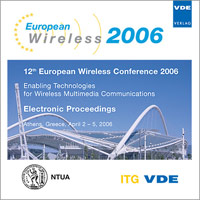On-demand channel switching for multi-channel wireless MAC protocols
Conference: European Wireless 2006 - 12th European Wireless Conference 2006 - Enabling Technologies for Wireless Multimedia Communications
04/02/2006 - 04/05/2006 at Athens, Greece
Proceedings: European Wireless 2006
Pages: 9Language: englishTyp: PDF
Personal VDE Members are entitled to a 10% discount on this title
Authors:
Papadopouli, Maria; Porwal, Priyank (Department of Computer Science, University of North Carolina at Chapel Hill)
Abstract:
We propose and analyze the on-demand switching (ODC), a broadcast-based medium access control (MAC) protocol for ad-hoc wireless networks with multiple channels and a single half-duplex transceiver at each host. The ODC performs an on-demand, dynamic, channel selection based on the traffic conditions of the channels and communication patterns of the participating hosts. A host stays on a channel as long as its traffic share on that channel is above a certain threshold, below which it switches to another channel. It broadcasts its departure and arrival before and after each channel switch, respectively. Hosts keep track of these broadcasts and use them to discover their receivers. The channel selection is thus based on reducing the unnecessary receives, while still being able to send and receive legitimate traffic. It results in increased bandwidth utilization, reduced packet delays, and increased energy savings. We evaluated the performance of the ODC with extensive simulations and compared it with the IEEE 802.11 and another related MAC protocol (MMAC). We found that the flow distribution and traffic among hosts have a great impact on its performance. For example, in one-to-one schemes with heavy load traffic, there is an up to 180% increase in the aggregate throughput compared to the IEEE 802.11, and a 15-35% increase compared to the MMAC. On the other hand, star or clique flow distributions tend to favor the IEEE 802.11 over the ODC and MMAC.


